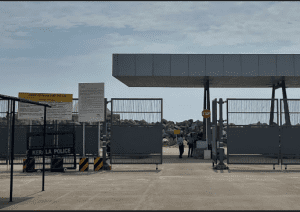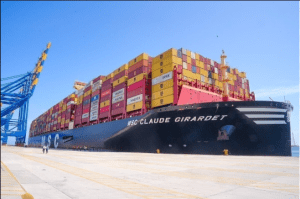Kerala: On May 1, 2025, Prime Minister Narendra Modi arrived in Thiruvananthapuram, Kerala, to inaugurate the highly anticipated Vizhinjam International Seaport, a major infrastructure project that will enhance the state’s position on the global maritime map. This development holds enormous significance for Kerala’s economy and its status as a key maritime hub in India.
 A Game-Changer for Kerala’s Economy
A Game-Changer for Kerala’s Economy
The Vizhinjam port, located around 16 kilometers south of Thiruvananthapuram, is expected to revolutionize the shipping and logistics sector in Kerala. The port’s strategic location, at the crossroads of major international shipping routes, has positioned it as a crucial trade hub connecting the East and West. PM Modi’s visit underscored the importance of this initiative, which aims to boost the state’s economy by facilitating increased trade, creating job opportunities, and generating new growth prospects in the maritime sector.
Vizhinjam Port: Key Features and Benefits
The Vizhinjam Port, once fully operational, will not only be India’s deepest container transshipment port but will also serve as a central hub for international maritime traffic in the Indian Ocean region. Built with modern infrastructure, the port is designed to handle large container ships that are typically unable to dock at other Indian ports due to their depth constraints. This deep-water port will allow large vessels to enter with ease, making it a critical asset for global trade.
The port’s construction has been a long-awaited project for the state, with the foundation stone laid in 2015. However, the project faced several delays, including opposition from local fisherfolk and environmental concerns. Despite these hurdles, the vision of transforming Kerala into a maritime powerhouse has now come to fruition with PM Modi’s visit signaling a new era for the state’s maritime industry.
The Strategic Importance of the Project
During his address at the inauguration ceremony, Prime Minister Modi emphasized the pivotal role of the Vizhinjam port in India’s “Sagarmala” initiative, which aims to modernize the country’s ports and enhance the connectivity between coastal areas and hinterlands. The project aligns with the central government’s broader vision of enhancing India’s global competitiveness and bolstering trade through its ports. This will help reduce logistics costs and improve the efficiency of trade, benefiting both domestic and international stakeholders.
Kerala, which already has a well-established maritime history, is poised to take advantage of this new infrastructure. The state’s strategic location on the southwestern coast of India will allow it to tap into global trade networks, providing direct access to international shipping lanes and offering enormous potential for trade, logistics, and tourism.
Job Creation and Economic Opportunities
Beyond its commercial potential, the Vizhinjam International Seaport is also expected to be a significant job creator. The project will generate thousands of direct and indirect employment opportunities, especially in the logistics, transportation, and shipbuilding sectors. PM Modi highlighted the potential for Kerala to become a major employment hub, offering livelihoods for local communities, particularly those along the coast who have been directly impacted by the port’s construction.
Additionally, the port is expected to boost ancillary industries such as warehousing, ship repair services, and maritime tourism. With the enhancement of regional connectivity, Kerala will also see an uptick in tourism, with more visitors expected due to the improved access and facilities for international cruise liners.
The Green Port: Focus on Sustainability


Prime Minister Modi’s remarks during his visit highlighted the need for development to go hand-in-hand with environmental consciousness. The integration of green technology and sustainable practices in the design and operation of the port reflects India’s broader commitment to addressing climate change and ensuring that future infrastructure projects are aligned with sustainable development goals.
Strengthening Maritime Diplomacy
The inauguration of the Vizhinjam Port also holds significant diplomatic implications. With growing global interest in the Indian Ocean and maritime trade, the port enhances India’s ability to foster stronger maritime diplomacy. The project serves as a beacon of India’s growing influence in global trade networks, signaling to the world that the country is open for business and committed to supporting regional cooperation in maritime security, trade, and development.
PM Modi’s visit to the port signifies a broader geopolitical strategy where India is increasingly seen as a key player in maritime trade in the Indian Ocean region. The port will serve as a gateway for goods flowing in and out of India, strengthening ties with key international trade partners.
A Vision for the Future


The port’s inauguration marks the beginning of a new chapter for Kerala. It is expected to provide a strong foundation for the state to emerge as a global maritime center, creating jobs, boosting exports, and helping India strengthen its maritime presence on the world stage.
In conclusion, Prime Minister Modi’s visit to Vizhinjam port signifies the importance of this infrastructure development not just for Kerala, but for India’s economic and geopolitical aspirations. The successful completion of the port will transform Kerala’s economy, create immense employment opportunities, and open up new possibilities for regional and global trade, firmly establishing the state as a key player in the global maritime arena.
The Vizhinjam International Seaport will play a vital role in India’s maritime future, driving trade, economy, and positioning Kerala as a key player in global maritime trade.
You can read the full official release here.
For more real time updates, visit Channel 6 Network.

